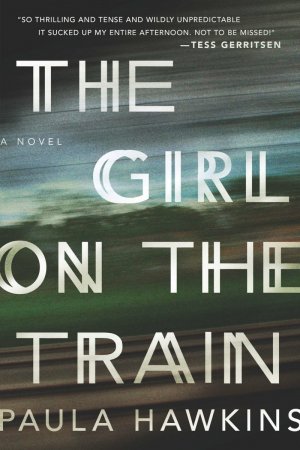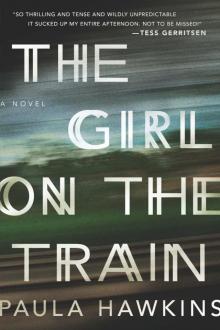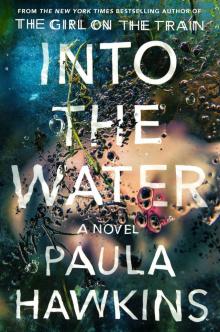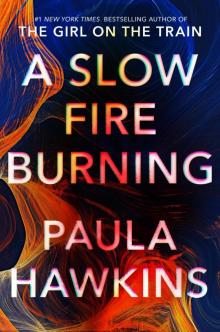- Home
- Paula Hawkins
Into the Water Page 9
Into the Water Read online
Page 9
She wasn’t upset about the funeral. She was upset because Patrick had drowned the tabby in the river that morning. It was pregnant, he told her, and they couldn’t afford to let the place get overrun with cats. They’d become a nuisance. He was right, of course, but that didn’t help. The tabby, wild as she was, had begun to feel like a pet to Helen. She liked watching her pad across the courtyard every morning, sniffing around the front door for a treat, lazily swatting at the bees buzzing around the rosemary. The thought of it made her well up again.
After Sean went upstairs, she said, “You didn’t have to drown her. I could have taken her to the vet, they could have put her to sleep.”
Patrick shook his head. “No need,” he said gruffly. “It’s the best way. It was over very quickly.”
But Helen had seen the deep scratches on his forearms attesting to how strongly the cat had fought. Good, she thought. I hope she bloody hurt you. Then she felt bad, because of course he hadn’t done it to be cruel. “I’ll need to do something about those,” she said, indicating the marks on his arms.
He shook his head. “It’s all right.”
“It’s not all right, you could get an infection. And you’re going to get blood on your shirt.”
She sat him down at the kitchen table, cleaned his scratches and rubbed antiseptic into the wounds, then taped up the worst cuts with Elastoplast. He watched her face all the while, and she imagined he must have felt a bit remorseful because when she was finished he kissed her hand and said, “Good girl. You’re a good girl.”
She got to her feet and moved away from him, stood at the kitchen sink with her hands on the counter and looked at the sun-drenched cobbles. She bit her lip.
Patrick sighed, lowering his voice to a murmur. “Look, love, I know this is difficult for you. I know that. But we need to go as a family, don’t we? We need to support Sean. This is not about grieving for her. This is about us putting all that business behind us.”
Helen couldn’t tell whether it was the words he spoke or his breath on the back of her neck, but her hair stood up on end. “Patrick,” she said, turning to look at him. “Dad. I need to talk to you about the car, about—”
Sean was coming down the stairs loudly, two at a time.
“About what?”
“Never mind,” she said, and he frowned. She shook her head. “It doesn’t matter.”
She went upstairs and washed her face and put on the dark grey trouser suit usually reserved for attending the school board. She ran a comb through her hair, trying not to meet her own eye in the mirror. She didn’t want to admit, even to herself, that she was afraid; she didn’t want to face what she was afraid of. She’d found some things in the glove box of her car, things she couldn’t explain, and she wasn’t sure she wanted the explanation. She’d taken everything and hidden it—stupidly, childishly—under her bed.
“Are you ready?” Sean was calling to her from downstairs. She took a deep breath, forcing herself to look at her own reflection, at her pale, clean face, her eyes clear as grey glass.
“I’m ready,” she said, to herself.
• • •
HELEN SAT IN THE BACKSEAT of Sean’s car, Patrick riding up front next to his son. Nobody spoke, but she could tell by the way her husband kept touching his palm to his wrist that he was anxious. He would be hurting, of course. All this—these deaths in the river—raised painful memories for him and his father.
As they crossed the first bridge, Helen glanced down at the greenish water and tried not to think of her held down, fighting for her life. The cat. She was thinking of the cat.
JOSH
I had a fight with Mum before we left for the funeral. I came downstairs and she was there in the hallway, putting on lipstick in the mirror. She was wearing a red top. I said, You can’t wear that to a funeral, it’s disrespectful. She just kind of gave a funny laugh and went into the kitchen and carried on as though I hadn’t said anything at all. I wasn’t about to give up on it, though, because we don’t need any more attention drawn to us. The police are bound to be there—the police always show up at the funerals of people who die in suspicious ways. It’s bad enough that I’ve already lied to them, and that Mum did too—what are they going to think when they see her turning up dressed like she’s going to a party?
I followed her into the kitchen. She asked me if I wanted some tea, and I said no. I said I didn’t think she should be going to the funeral at all, and she said, why on earth not? You didn’t even like her, I said. Everyone knows you didn’t like her. She gave me this annoying smile and said, oh they do, do they? I said, I’m going because I’m Lena’s friend, and she said, no you’re not. Dad came downstairs and said, don’t say that, Lou. Of course he is. He said something to her, really quietly so I couldn’t hear, and she nodded and went upstairs.
Dad made me some tea, which I didn’t want, but I drank it anyway.
“Will the police be there, do you think?” I asked him, even though I knew the answer.
“I expect so. Mr. Townsend knew Nel, didn’t he? And, well—I imagine a number of people from the village will want to pay their respects, whether they knew her or not. I know . . . I know it’s complicated with us, but I think it’s right that we try to pull together, don’t you?” I didn’t say anything. “And you’ll want to see Lena, won’t you, to tell her how sorry you are. Imagine how poor Lena must be feeling.” I still didn’t say anything. He reached out to ruffle my hair, but I ducked away from him.
“Dad,” I said, “you know how the police asked about Sunday night, about where we were and all that?”
He nodded, but as he did I saw him look over my head to check Mum wasn’t listening. “You said you didn’t hear anything unusual, didn’t you?” he asked. I nodded. “You told the truth.”
I wasn’t sure whether he said, You told the truth? like a question, or You told the truth, like it was an instruction.
I wanted to say something, I wanted to say it out loud. I wanted to say, What if? What if she did something bad?, just so Dad could tell me how ridiculous I was being, so he could shout at me and say, How could you even think that?
I said, “Mum went to the shops.”
He looked at me like I was thick. “Yes, I know. She went to the shops that morning to get milk. Josh . . . Oh! There you go,” he said, looking over my shoulder. “There she is now. That’s better, isn’t it?”
She’d changed her red shirt to a black one.
It was better, but I was still scared of what was going to happen. I was scared that she’d say something, or that she’d laugh in the middle of the ceremony or something. She had a look at that moment that was really bugging me, not like she was happy or anything, it was more like . . . like the look she gives Dad when she wins an argument, like when she says, I told you it would have been quicker to take the A68. It was like she’d been proved right about something and she couldn’t get that winning look off her face.
• • •
WHEN WE GOT to the church there were already a lot of people milling around—that made me feel a bit better. I saw Mr. Townsend and I think he saw me, but he didn’t come over and say anything. He was just standing there, looking around, and then he stopped and watched as Lena and her aunt walked over the bridge. Lena looked really grown-up, different from how she normally is. Still pretty. As she walked past us she saw me and gave me a sad smile. I wanted to go over and give her a hug, but Mum was holding on to my hand really tightly so I couldn’t pull away.
I needn’t have worried about Mum laughing. When we got into the church she started crying, sobbing so loudly that other people turned around and looked. I wasn’t sure whether that made things better or worse.
LENA
This morning I felt happy. I was lying in bed, covers thrown back. I could feel the heat of the day building and I knew it was going to be beautiful, and I could hear Mum singing. Then I w
oke up.
On the back of my bedroom door hung the dress I was planning to wear. It’s Mum’s, from Lanvin. She’d never in a million years let me wear it, but today I didn’t think she’d mind. It hadn’t been dry-cleaned since she wore it last, so it still smelled of her. When I put it on, it was like having her skin against mine.
I washed and dried my hair, then tied it back. I usually wear it down, but Mum liked it up. Totes sophis, she’d say in the way she did when she wanted me to roll my eyes at her. I wanted to go into her room to look for her bracelet—I knew it would be in there somewhere—but I couldn’t do it.
I haven’t been able to bring myself to go into her room since she died. The last time I was in there was last Sunday afternoon. I was bored and feeling sad about Katie, so I went into her room to look for some weed. I couldn’t find any in the bedside table, so I started looking through her coat pockets in the wardrobe, because sometimes she keeps stuff in there. I wasn’t expecting her home. When Mum caught me, she didn’t look pissed off, she just looked sort of sad.
“You can’t tell me off,” I said. “I’m looking for shit in your room. So you can’t get pissed off with me. That would make you a total hypocrite.”
“No,” she said, “that would make me a grown-up.”
“Same thing,” I said, and she laughed.
“Yeah, maybe, but the fact is that I’m allowed to smoke weed and drink alcohol and you are not. Why are you looking to get wasted in the middle of a Sunday afternoon anyway? On your own? Kind of sad, isn’t it?” Then she went on, “Why don’t you go for a swim or something? Call a friend?”
I lost it with her, because it sounded like she was saying the kind of thing that Tanya and Ellie and all those bitches say about me—that I’m sad, that I’m a loser, that I’ve got no friends now the only person who ever liked me topped herself. I started yelling, “What fucking friend? I don’t have any, don’t you remember? Don’t you remember what happened to my best friend?”
She went really quiet and held her hands up, the way she does—did—when she doesn’t want a fight. But I didn’t back off, I just wouldn’t back off. I was yelling about how she was never around, how she just left me alone all the time, how she was so distant it seemed like she didn’t even want me around at all. She was shaking her head, saying, “That isn’t true, that isn’t true.” She said, “I’m sorry if I’ve been distracted, but there are some things going on that I can’t explain. There’s something I need to do, and I can’t explain how difficult it is.”
I was cold with her. “You don’t need to do anything, Mum. I swear you promised me you’d keep your mouth shut. So you don’t have to do anything. Jesus, haven’t you done enough already?”
“Lenie,” she was saying, “Lenie, please. You don’t know everything. I’m the parent here, you have to trust me.”
I said some shitty things then, about how she’d never been much of a parent, what kind of parent has dope lying around the house and brings men home at night so that I can hear? I told her that if it had been the other way round, if it had been me who’d been in trouble like Katie was, Louise would have known what to do, she’d have been the parent and she’d have done something and she’d have helped. And it was all bullshit, of course, because I was the one who didn’t want Mum to say anything, and she pointed that out and then she said that in any case she had tried to help. And then I just started screaming at her, telling her everything was her fault, that if she went and blabbed to anyone I would leave and never speak to her again. I said it over and over, You’ve done enough damage. The last thing I ever said to her was that it was her fault Katie was dead.
JULES
It was hot, the day of your funeral, heat shimmering over the water, the light too bright, the air too close, heavy with moisture. Lena and I walked to the church. She started out a few paces in front of me, and the distance between us stretched; I’m no good in heels, she is a natural. She looked very elegant, very beautiful, much older than her fifteen years, in a black crépe dress with a keyhole on the bodice. We walked in silence, the river snaking muddily past us, sullen and quiet. The warm air smelled of decay.
I felt afraid, as we turned the corner on the approach to the bridge, of who might be at the church. I was afraid that no one would turn up at all and that Lena and I would be forced to sit alone with nothing but you between us.
I kept my head down, I watched the road, I concentrated on putting one foot in front of the other, trying not to stumble on the uneven tarmac. My shirt (black and synthetic with a pussy bow at the throat, wrong for the weather) clung to my lower back. My eyes began to water. No matter, I thought, if my mascara runs. People will think I’ve been crying.
Lena still hasn’t cried. Or at least she hasn’t cried in front of me. Sometimes I think I hear her sobbing in the night, but she comes to breakfast clear-eyed and insouciant. She slips in and out of the house without a word. I hear her talking in a low voice in her room, but she ignores me, she shrinks from me when I approach, she snarls at my questions, she shuns my attention. She wants nothing to do with me. (I remember you coming into my room after Mum died. You wanted to talk, I sent you away. Is this the same? Is she doing the same thing? I can’t tell.)
As we approached the churchyard I noticed a woman sitting on a bench by the side of the road, who smiled at me with rotted teeth. I thought I could hear someone laughing, but it was just you, in my head.
Some of the women you wrote about are buried in that churchyard, some of your troublesome women. Were all of you troublesome? Libby was, of course. At fourteen she seduced a thirty-four-year-old man, enticed him away from his loving wife and infant child. Aided by her aunt, the hag May Seeton, and the numerous devils that they conjured, Libby cajoled poor blameless Matthew into any number of unnatural acts. Troublesome indeed. Mary Marsh was said to have performed abortions. Anne Ward was a killer. But what about you, Nel? What had you done? Who were you troubling?
Libby is buried in the churchyard. You knew where she lay, her and the others; you showed me the stones, scraped away the moss so that we could read the words. You kept some of it—the moss, I mean—and you snuck into my room and put some under my pillow, then you told me that Libby had left it there. At night she walked the riverbank, you told me; if you listened hard enough, you could hear her calling for her aunt, for May, to come and rescue her. But May never comes: she can’t. She isn’t in the graveyard. After they extracted her confession they hanged her in the town square; her body is buried in the woods outside the churchyard walls, nails driven through her legs so that she’ll never rise again.
At the crest of the bridge, Lena turned, just for a second, to look at me. Her expression—impatience, perhaps just a hint of pity—was so like yours that I shivered. I clenched my fists together and bit my lip: I cannot be afraid of her! She’s just a child.
My feet hurt. I could feel the prickle of sweat at my hairline, I wanted to rip the fabric of my shirt, I wanted to rip my skin. I could see a small crowd gathered in the car park in front of the church; they were turning now, turning towards us, watching our approach. I thought about how it would feel to pitch myself over the stone walls: terrifying, yes, but only for a short while. I could slip down into the mud and let the water close over my head; it would be such a relief to feel cold, to be unseen.
Inside, Lena and I sat side by side (a foot apart) in the front pew. The church was full. Somewhere behind us, a woman sobbed on and on, as though her heart were broken. The vicar talked about your life, he listed your achievements, he spoke of your devotion to your daughter. I was mentioned in passing. I was the one who had given him the information, so I suppose I couldn’t complain that his speech felt perfunctory. I could have said something myself, perhaps I should have done, but I couldn’t think how I could talk about you without betraying something—you, or myself, or the truth.
The service finished abruptly, and before I knew it Lena
was getting to her feet. I followed her along the aisle, the heat of attention turned towards us somehow threatening, not heartening. I tried not to see the faces around me, but I couldn’t help myself: the crying woman, her face crumpled and red; Sean Townsend, his eyes meeting mine; a young man with head bowed; a teenager laughing behind his fist. A violent man. I stopped suddenly, and the woman behind me stepped on my heel. “Sorry, sorry,” she muttered, manoeuvring past. I didn’t move, didn’t breathe, couldn’t swallow, my insides turning to liquid. It was him.
Older, yes, uglier, gone to seed, but unmistakable. A violent man. I waited for him to turn his eyes to me. I thought that if he did, one of two things would happen: I would cry or I would lunge at him. I waited, but he wasn’t looking at me. He was looking at Lena, watching her intently. My liquid insides turned to ice.
I followed blindly, pushing people out of my way. He stood to one side, his eyes still trained on Lena. He was watching her take off her shoes. Men watch girls who look like Lena in all sorts of ways: desire, hunger, distaste. I couldn’t see his eyes, but I didn’t need to. I knew what was in them.
I started towards him, a noise rising in my throat. People were looking at me, with pity or confusion, I didn’t care. I needed to get to him . . . And then he turned abruptly and walked away. He walked quickly down the pathway and out into the car park, and I stood, breath suddenly rushing to my lungs, adrenaline making my head swim. He climbed into a large green car and was gone.
“Jules? Are you all right?” DS Morgan appeared at my side and placed a hand on my arm.
“Did you see that man?” I asked her. “Did you see him?”
“Which man?” she said, looking around her. “Who?”
“He’s a violent man,” I said.
She looked alarmed. “Where, Jules? Did someone do something . . . say something to you?”
“No, I . . . no.”

 Girl on the Train
Girl on the Train The Girl on the Train
The Girl on the Train Into the Water
Into the Water A Slow Fire Burning
A Slow Fire Burning